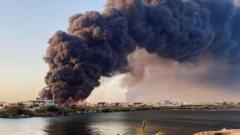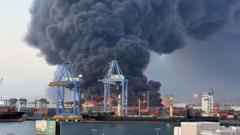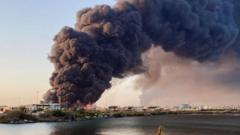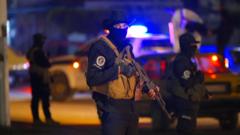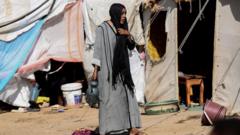In a haunting reminder of the Syrian civil war's brutality, survivors recount their traumas while investigations into war crimes continue against the regime.
Sarin Gas Attack: A Harrowing Legacy in Eastern Ghouta

Sarin Gas Attack: A Harrowing Legacy in Eastern Ghouta
Survivors of the 2013 chemical attack in Syria's suburbs seek justice for the horrors inflicted upon them.
The basement of an underground medical center in eastern Ghouta served as the last refuge for many during the horrendous chemical strike that occurred in August 2013. On that fateful hot and windless night, around 2 a.m., a volley of rockets struck the Damascus suburb, initially sounding innocuous. However, the aftermath revealed a horrific truth: within minutes, responders discovered individuals choking, shaking, and foaming at the mouth. The chemical agent Sarin had unleashed a deadly wave, leading to the demise of at least 1,500 individuals—men, women, and children—who were unsuspecting victims, predominantly asleep in their homes.
This shocking attack, labeled a crossing of President Barack Obama’s “red line” against the use of chemical weapons, saw no immediate military or judicial response from the international community. Despite widespread condemnation, no punitive actions were directed towards President Bashar al-Assad or his regime, which remained unscathed following the attacks.
Now, nearly a decade later, Assad, who sought refuge in Russia after losing ground to a rebel uprising, faces potential war crime charges in France related to the chemical assault. Investigators, alongside survivors, underline these chemical attacks as emblematic of Assad's brutal grip on power and a desperate plea to retain control amid growing dissent.
While justice remains elusive, the scars of violence and terror linger in eastern Ghouta—forever etched in the memories of those who survived.
This shocking attack, labeled a crossing of President Barack Obama’s “red line” against the use of chemical weapons, saw no immediate military or judicial response from the international community. Despite widespread condemnation, no punitive actions were directed towards President Bashar al-Assad or his regime, which remained unscathed following the attacks.
Now, nearly a decade later, Assad, who sought refuge in Russia after losing ground to a rebel uprising, faces potential war crime charges in France related to the chemical assault. Investigators, alongside survivors, underline these chemical attacks as emblematic of Assad's brutal grip on power and a desperate plea to retain control amid growing dissent.
While justice remains elusive, the scars of violence and terror linger in eastern Ghouta—forever etched in the memories of those who survived.








